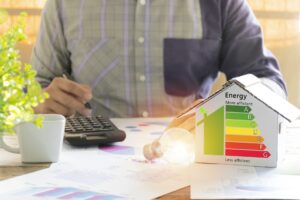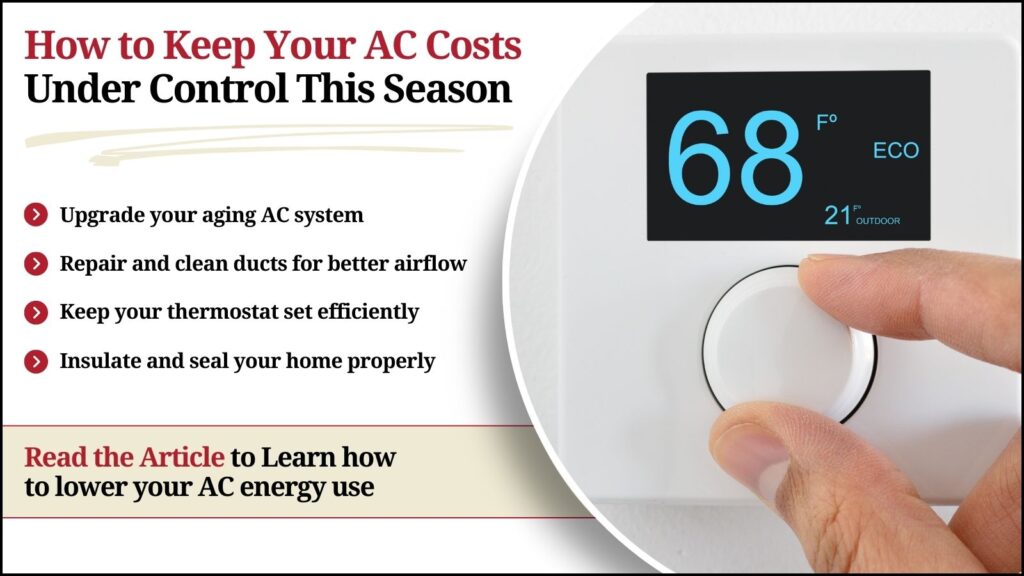
As temperatures climb, so can your energy bills—especially if your air conditioning system is working overtime to keep your home cool. Understanding how your AC contributes to energy consumption and what steps you can take to manage that usage can lead to significant savings throughout the season. With just a few smart strategies and a bit of awareness, you can stay comfortable without breaking the bank. Choosing the right HVAC professionals is key—start by reviewing these tips for hiring a trusted HVAC team to ensure your system is properly serviced and optimized.

What Affects AC Energy Consumption?
Several factors influence how much energy your air conditioner uses, and they’re not all within your control. However, knowing what impacts your energy use can help you make informed decisions about system maintenance, upgrades, and day-to-day operation. For example, an aging unit with recurring issues like hard starts or inconsistent cooling may be showing early signs of AC compressor failure a problem that can greatly increase energy use if not addressed.
1. System Age and Efficiency
Older AC units typically have lower SEER (Seasonal Energy Efficiency Ratio) ratings than newer models. A system that’s over 10–15 years old may require much more electricity to achieve the same cooling power, especially if it hasn’t been regularly maintained.
2. Size and Capacity of the Unit
If your AC system is not properly sized for your home—either too large or too small—it can result in inefficient operation. An oversized unit may short-cycle, turning on and off too frequently, while an undersized unit may run constantly to try to keep up with demand.
3. Home Insulation and Sealing
Poor insulation or air leaks around doors and windows allow cool air to escape and hot air to enter, forcing your AC to work harder to maintain your desired temperature.
4. Thermostat Settings
Setting your thermostat lower than necessary can significantly increase your energy usage. Each degree you lower your thermostat below 78°F can increase energy use by roughly 6–8%.
5. Duct Condition and Airflow
Leaky or dirty ductwork can restrict airflow and waste cooled air, reducing your system’s efficiency and driving up energy costs.
Tips for Boosting Efficiency and Saving Money
The good news is that there are several ways you can reduce your AC’s energy consumption without sacrificing comfort.
1. Schedule Regular Maintenance
An annual AC tune-up ensures your system is operating at peak efficiency. Technicians will clean coils, check refrigerant levels, inspect electrical components, and ensure optimal airflow—all of which help your system use less energy.
2. Change Air Filters Monthly
A dirty filter restricts airflow and forces your system to work harder. Changing your filter regularly—especially during peak cooling season—can reduce energy usage by up to 15%.
3. Use a Programmable or Smart Thermostat
Set your thermostat to higher temperatures when you’re not home or asleep. Smart thermostats can automatically adjust based on your schedule and preferences, maximizing savings.
4. Seal and Insulate Your Home
Use caulk or weatherstripping around windows and doors to prevent air leaks. Attic and wall insulation also play a major role in maintaining indoor comfort with less energy.
5. Use Ceiling Fans Wisely
Fans don’t cool the air but help create a wind-chill effect, making you feel cooler. When used in combination with your AC, you can set your thermostat a few degrees higher without sacrificing comfort. Enhancing airflow and indoor comfort isn’t just about temperature modern AC systems also improve air quality by reducing humidity, allergens, and airborne particles.
Frequently Asked Questions
Question: What factors influence how much energy my AC uses?
Answer: Several factors affect AC energy consumption: how old and efficient the system is, whether it’s correctly sized for your home, how well your home is insulated and sealed, thermostat settings, and the condition of your ductwork and airflow.
Question: How does thermostat setting impact energy bills?
Answer: Setting your thermostat lower than needed can cause a spike in energy use. The article notes that lowering the thermostat more than necessary, especially below about 78 °F, can increase energy consumption by roughly 6 to 8 percent per degree.
Question: What are simple actions I can take to reduce AC energy usage?
Answer: You can schedule regular maintenance, change filters monthly, use a programmable or smart thermostat, seal and insulate your home, and run ceiling fans to allow setting the thermostat a few degrees higher while maintaining comfort.
Question: Why is system age and efficiency important for energy use?
Answer: Older AC units generally have lower efficiency, so they need more electricity to cool your space. If a system is over 10 to 15 years old and hasn’t been maintained well, its energy demands can be significantly higher.
Question: How does duct condition affect cooling efficiency?
Answer: Leaky or dirty ductwork reduces airflow and causes cooled air to escape before reaching rooms, making the system work harder and driving up energy costs.
Contact Snellville Heating, Air and Plumbing, where your comfort is OUR business. We’ll set you up right for 2025 with a new and improved heat pump system.



